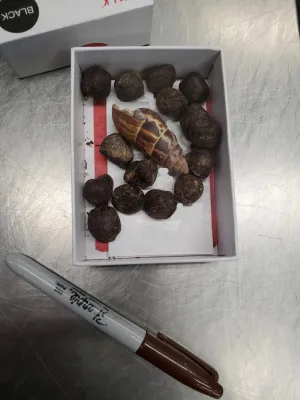MINNEAPOLIS—U.S. Customs and Border Protection (CBP) agriculture specialists at Minneapolis – Saint Paul International Airport (MSP) inspected a small box containing giraffe fecal material.
On September 29, a passenger returning from Kenya arrived at MSP and was selected for inspection by CBP agriculture specialists. The passenger declared giraffe feces and stated she had obtained the droppings in Kenya and planned to make a necklace. The passenger also stated in the past she had used moose feces at her home in Iowa. Agriculture Specialists seized the box, and the excrement was destroyed via steam sterilization per United States Department of Agriculture (USDA) destruction protocol.
“There is a real danger with bringing fecal matter into the U.S.,” said LaFonda D. Sutton-Burke, CBP Director, Field Operations-Chicago Field Office. “If this person had entered the U.S. and had not declared these items, there is high possibility a person could have contracted a disease from this jewelry and developed serious health issues."
All ruminant animal feces require a Veterinary Services Permit for entry into the United States. Kenya is affected with African Swine Fever, Classical Swine Fever, Newcastle disease, Foot and Mouth disease, and Swine Vesicular Disease.
“CBP’s agriculture specialists mitigate the threat of non-native pests, diseases, and contaminants entering the United States” said Augustine Moore, CBP Area Port Director-Minnesota. “CBP agriculture specialists have extensive training and experience in the biological and agriculture sciences, they inspect travelers and cargo arriving in the United States by air, land, and seaports of entry.
CBP's border security mission is carried out at 328 ports of entry. Please visit CBP Ports of Entry to learn more about how CBP’s Office of Field Operations secures our nation’s borders. Learn more about CBP at www.CBP.gov.


